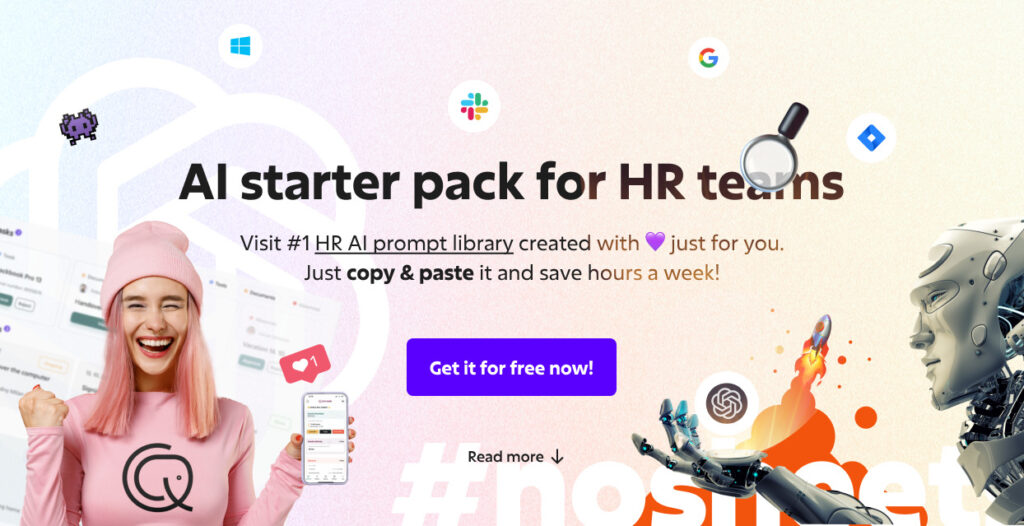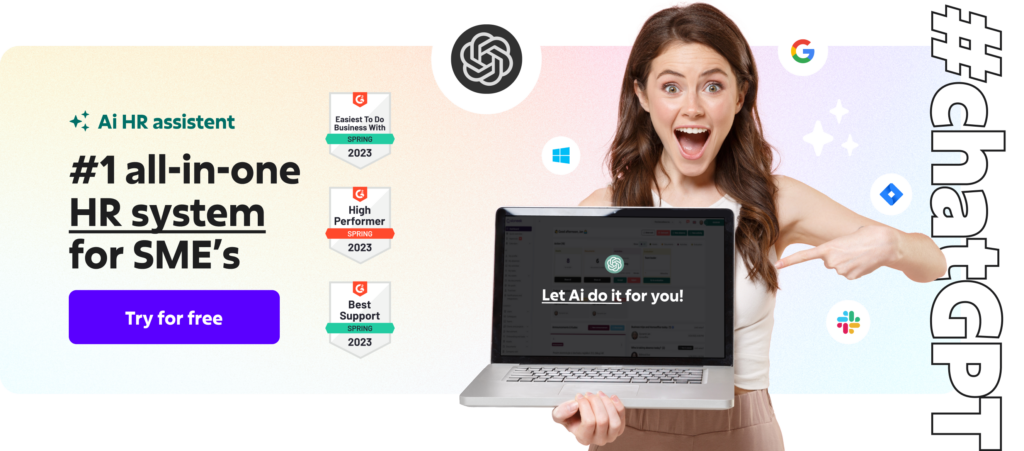Will HR be Replaced by AI?

In today’s ever-evolving landscape of technology, the integration of artificial intelligence (AI) into various sectors has raised questions about the role of human resources (HR) in the future.
This article delves into the impact of AI on HR processes, exploring its potential benefits and drawbacks. So, what do you need to know about this intriguing intersection of human skills and AI-powered tools?
Introduction to AI for human resources
How is AI used in HR?
In the realm of HR, AI has found its footing in several key areas, revolutionizing traditional HR practices.
Using ChatBot with knowledge base
Chatbots equipped with knowledge bases have become integral for automating interactions with potential candidates and employees.
These virtual assistants provide instant answers to common queries, enhancing the candidate experience and freeing HR professionals from repetitive tasks.
Automation of HR processes
One of the primary advantages of AI in HR is the automation of routine and administrative tasks.
From sorting through resumes to scheduling interviews, AI streamlines the hiring process, allowing HR teams to focus on more strategic, human-centric aspects of their roles.
Reduced time for repetitive tasks
With the assistance of AI, HR professionals spend less time on mundane tasks, such as drafting emails, generating reports, or updating employee records.
This newfound efficiency enables them to invest their energy in activities that boost employee productivity and company culture.
Less writing & more hiring
AI’s ability to generate job descriptions and offers not only expedites the recruitment process but also ensures the quality and consistency of these documents.
This allows HR teams to dedicate more time to identifying and nurturing potential candidates.
Mapping candidates to employee & candidate files
AI excels in matching candidates to employee and candidate files. Its algorithms assess qualifications, skills, and experience, helping HR professionals identify the most qualified candidates quickly and efficiently.
Key AI features for HR
AI introduces a new era of efficiency and innovation. Let’s delve into the key AI features transforming HR practice.
AI-driven documents & templates
AI offers the creation of standardized documents and templates, ensuring consistency in HR processes and communications. Whether it’s offer letters or employee handbooks, AI-driven solutions simplify document management.
AI image generation can significantly enhance HR practices by creating engaging and personalized visuals for various purposes. For instance, it can produce custom images for training modules, illustrating conflict resolution styles or diverse team collaborations, and create eye-catching visuals for internal communications, such as announcements or newsletters. Moreover, AI aids in strengthening employer branding by generating unique recruitment campaign imagery that showcases company culture and values, and can produce personalized onboarding materials. Additionally, it can create diverse and inclusive visuals for diversity training or marketing, ultimately improving employee experience and communication effectiveness.
Generating OKRs & evaluations
Performance management becomes more data-driven and efficient with AI’s assistance. It can generate objectives and key results (OKRs) and evaluations based on predefined criteria, ensuring a fair and consistent approach.
Employee skills management
AI aids in the identification and tracking of employee skills, helping HR professionals make informed decisions regarding training, promotions, and employee development.
Generating job descriptions & offers
Consistency in job descriptions and offer letters is crucial. AI ensures uniformity and accuracy in these documents, eliminating potential discrepancies.
Checklist automation
AI can create and manage checklists for various HR processes, simplifying onboarding, compliance, and other tasks that require meticulous attention.
Advantages & Disadvantages of Using AI in HR
Pros of using AI in HR
Efficiency and Time Savings
AI streamlines HR processes, saving time and resources.
Enhanced Candidate Experience
Chatbots and AI-driven interactions create a positive candidate experience.
Improved Employee Performance
AI-driven performance management leads to better outcomes.
Consistency and Accuracy
AI ensures consistency in documentation and decision-making.
Cons of using AI in HR
Loss of Human Touch
Over-reliance on AI may hinder the personal touch in HR interactions.
Bias in Algorithms
AI algorithms may inadvertently perpetuate biases if not carefully designed.
Initial Investment
Implementing AI in HR requires a financial commitment and learning curve.
Limited Complex Decision-Making
AI excels in routine tasks but may struggle with complex, nuanced situations.
Conclusion
In the evolving world of HR, AI is not replacing human resources; it’s augmenting it. The collaboration between AI and HR professionals can lead to improved hiring processes, employee engagement, and company culture.
While AI is a powerful tool, the human touch remains essential for complex decision-making and nurturing employee relationships.
Frequently asked questions
Will AI replace HR?
No, AI in HR is not replacing human workers but enhancing their capabilities. HR professionals are pivotal in complex decision-making and employee relationship management, bringing strategic thinking, specialized roles, business acumen, and critical skills to the table.
While AI excels at automating routine tasks, HR experts possess the unique ability to interpret AI-generated data and apply their strategic insights to align HR initiatives with broader organizational goals. Their specialized roles, such as employee relations and diversity and inclusion, demand a nuanced human touch that AI cannot replicate.
HR professionals, with their deep understanding of the business context and industry intricacies, make informed judgments regarding talent acquisition and workforce planning. Moreover, their interpersonal skills, empathy, and emotional intelligence are indispensable for fostering employee engagement and maintaining a positive company culture.
In essence, AI and HR professionals form a symbiotic partnership, where technology streamlines operations, and human expertise drives strategic HR functions and nurtures employee relationships.
Is HR a dying field?
No, HR is not a dying field. AI and machine learning assist in automating routine tasks such as recruiting process, applicant tracking , screening process, selection process, employee training, employee onboarding, and more. This allows HR professionals to focus on strategic, people-oriented aspects of their roles.
How to benefit from using AI in HR?
Embrace AI-powered HR tools to streamline processes and complex tasks without human intervention, enhance the candidate and employee experience, and make data-driven decisions to boost employee productivity and career development.
Which HR roles might be replaced by AI?
Roles focused on routine administrative and arduous tasks, such as data entry, document generation, and simple candidate interactions, are most likely to be impacted by AI. However, strategic roles and HR functions requiring complex decision-making and human skills will remain essential.





